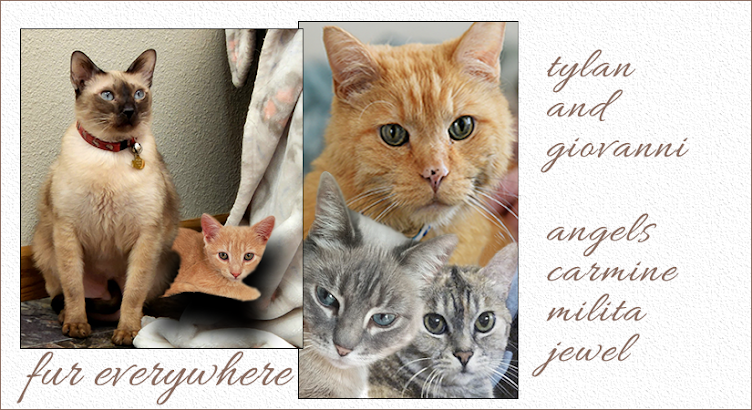
In my last post, I began a list of foods that are toxic to cats. The following foods are also toxic to cats. Remember to seek veterinary attention right away if you believe your pet has ingested or come in contact with a poisonous food or plant.
Onions: If your feline ingests onion, he or she may experience vomiting, panting, gastrointestinal discomfort, a drop in red blood cells (hemolytic anemia or Heinz body anemia), weakness, high heart rate, and/or blood in his or her urine.
Rhubarb: Cats who ingest rhubarb may have severe reactions such as salivation, tremors, and/or kidney failure.
Oranges: Vomiting, possible photosensitivity, diarrhea, and depression may occur if your feline eats orange. The essential oils and psoralens found in oranges are toxic to cats.
Tomato: Tomatoes are another food that can cause some pretty severe symptoms for felines who ingest them. These may include: loss of appetite, weakness, dilated pupils, hypersalivation, behavior changes, drowsiness, slow heartbeat, and central nervous system depression.
Raw fish: Feeding your cat raw fish may result in a thiamine (a type of B vitamin) deficiency, which may also lead to seizures and a loss of appetite. In severe cases, the thiamine deficiency can result in death.
Dog food: According to Entirely Pets, if your feline accidentally eats dog food, it should not cause problems. However, if you are feeding your cat dog food on a regular basis, your pet may begin suffering from malnutrition and may develop different types of heart disease.
Milk: Believe it or not, most adult cats are lactose intolerant. Giving your feline milk may result in gastrointestinal distress in the form of vomiting or diarrhea. If you want to give your kitty milk, try Whiskas Cat Milk or CatSip, which are both lactose-free.
Liver: You can feed your feline a little liver without harming him or her, but feeding too much liver can lead to vitamin A toxicity. Signs of vitamin A toxicity include bone growths on the spine and/or elbows, osteoporosis, and bone deformities. Vitamin A toxicity can also lead to death.
Raisins: Raisins can lead to hyperactivity, repeated vomiting, and kidney failure if ingested by your pet.
Caffeine: Caffeine toxicity is a serious problem for cats. Rapid breathing, muscle tremors, heart palpitations, and restlessness are signs of caffeine toxicity. In severe cases, caffeine toxicity is fatal to cats. Caffeine can be found in coffee, tea, chocolate, soft drinks, energy drinks, and cocoa.
Chocolate: Chocolate is one of the most dangerous human foods cats can ingest. Ingesting chocolate may lead to seizures, abnormal heart rhythms, tremors, and death. The toxic chemical found in all types of chocolate is theobromine.
Baked goods, gum, and candy: According to WebMD, these human foods contain Xylitol, which can lead to an increase in the amount of insulin in your kitty's body. Initial symptoms of poisoning may include loss of coordination, vomiting, and lethargy. Seizures may also occur soon after Xylitol is ingested. Liver failure can occur within a mere few days of consumption.
Raw eggs: In addition to the possibility of raw eggs containing salmonella, they block the B vitamin biotin from being absorbed in a cat's body, which can lead to coat and skin problems.
Obviously, there are many human foods toxic to cats. If you believe your cat has eaten or come into contact with a poisonous food or plant, please seek veterinary care right away by going to your vet, local veterinary hospital, or calling the ASPCA National Animal Poison Control Center at 888-426-4435. Please be advised that the ASPCA National Poison Control Center may charge a $65 fee to your credit card for a consultation. Remember, this is not a complete list of toxic foods to cats. If you are ever in doubt about whether or not to feed your feline something, don't, until you've talked to your veterinarian about it.

Thank you for posting this very important list! :)
ReplyDelete